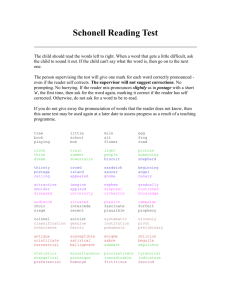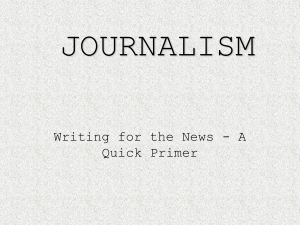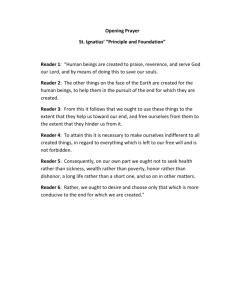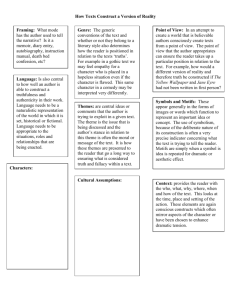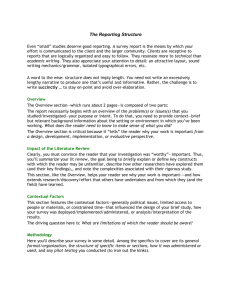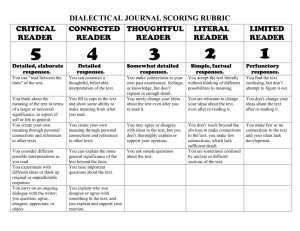Communication 206: Communication and Culture
advertisement
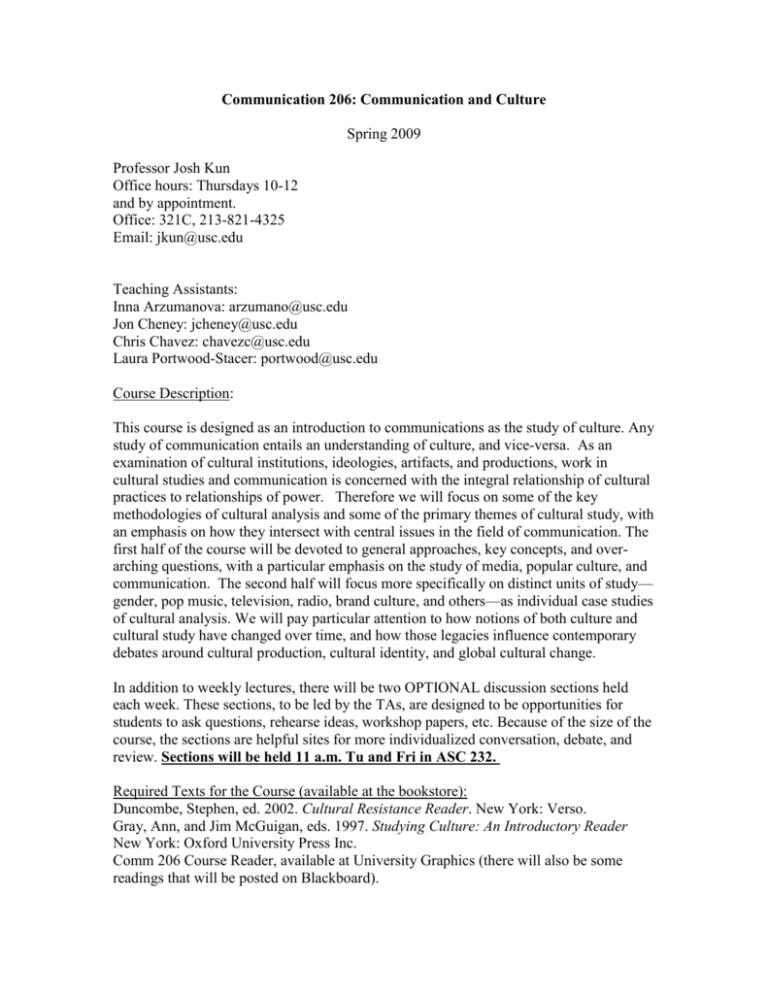
Communication 206: Communication and Culture Spring 2009 Professor Josh Kun Office hours: Thursdays 10-12 and by appointment. Office: 321C, 213-821-4325 Email: jkun@usc.edu Teaching Assistants: Inna Arzumanova: arzumano@usc.edu Jon Cheney: jcheney@usc.edu Chris Chavez: chavezc@usc.edu Laura Portwood-Stacer: portwood@usc.edu Course Description: This course is designed as an introduction to communications as the study of culture. Any study of communication entails an understanding of culture, and vice-versa. As an examination of cultural institutions, ideologies, artifacts, and productions, work in cultural studies and communication is concerned with the integral relationship of cultural practices to relationships of power. Therefore we will focus on some of the key methodologies of cultural analysis and some of the primary themes of cultural study, with an emphasis on how they intersect with central issues in the field of communication. The first half of the course will be devoted to general approaches, key concepts, and overarching questions, with a particular emphasis on the study of media, popular culture, and communication. The second half will focus more specifically on distinct units of study— gender, pop music, television, radio, brand culture, and others—as individual case studies of cultural analysis. We will pay particular attention to how notions of both culture and cultural study have changed over time, and how those legacies influence contemporary debates around cultural production, cultural identity, and global cultural change. In addition to weekly lectures, there will be two OPTIONAL discussion sections held each week. These sections, to be led by the TAs, are designed to be opportunities for students to ask questions, rehearse ideas, workshop papers, etc. Because of the size of the course, the sections are helpful sites for more individualized conversation, debate, and review. Sections will be held 11 a.m. Tu and Fri in ASC 232. Required Texts for the Course (available at the bookstore): Duncombe, Stephen, ed. 2002. Cultural Resistance Reader. New York: Verso. Gray, Ann, and Jim McGuigan, eds. 1997. Studying Culture: An Introductory Reader New York: Oxford University Press Inc. Comm 206 Course Reader, available at University Graphics (there will also be some readings that will be posted on Blackboard). Course Requirements: Students are required to attend class regularly, to contribute to class discussions, and to do weekly reading. Attendance in lecture is important: there is significant material covered in lecture that is not in the reading and you cannot pass the course if you do not attend most of the lectures. In addition, there will be frequent screenings in lecture for which you will be responsible. There are several writing assignments for this class, and because the lectures, discussions, reading assignments and course assignments are all vitally linked, it is critical that you keep up with the schedule. Students who miss more than four lectures will have their grades reduced and risk failing the course. The final course grade will be based on the following distribution: Four papers, each 20%. Class participation (not based solely on attendance), 10%. Posts on Two Cultural Events, submitted on Blackboard, 5% each. Papers: There are four papers due in this class. Each paper should be 5-7 pages long, checked for grammar and spelling, with proper citation practices. The details of each paper will be given in a prompt approximately one week before the papers are due (due dates are noted in the syllabus). These papers are designed to have you think theoretically about issues of culture; while they call on you to utilize readings, they are not intended to be summaries of arguments presented in the course, but rather are an opportunity for you to think about cultural practices that have some meaning to you within the context of the course readings. Papers are due in class (not as an email attachment), and there are no late papers accepted. If you have an emergency that impacts your ability to turn your paper in on time, you need to contact the professor before the paper is due. Each paper is worth 20% of your final grade. Cultural Event Posts: This assignment offers an opportunity for you to post a short analysis (this can be as short as one or two paragraphs) of a “cultural event” you attend throughout the semester. This can be an art event, such as a visit to a museum or an art exhibit; a musical event, such as a concert or a symphony; a theatre event; a fashion show; a photography exhibit, etc. The post does not require you to connect these events to course readings, although it is fine to do so; rather, it is simply an opportunity for you to relate your own activities to the discussions about culture we will be having in class. And, while surely events such as fraternity/sorority rush parties, raves, and other sorts of parties are also “cultural events” and often worthy of our analysis, for this assignment I’d like you to narrow the definition a bit to the kinds of events that involve a kind of cultural production. If you have questions about events, please email me. The first Blackboard post is due by October 16th, and the second by the beginning of finals week. Disability: Any student requesting academic accommodations based on disability is required to register with Disability Services and Programs (DSP) each semester. A letter of verification for approved accommodations can be obtained from DSP. Please be sure the letter is delivered to me as early in the semester as possible. DSP is located in STU 301 and is open 8:30 a.m. to 5:00 p.m., Monday through Friday. The phone number for DSP is (213) 740-0776. Annenberg School for Communication Academic Integrity Policy: The Annenberg School for Communication is committed to maintaining the highest standards of ethical conduct and academic excellence. Any student found responsible for plagiarism, fabrication, cheating on examinations, or purchasing papers or other assignments will receive a failing grade in the course and may be dismissed as a major. In addition to the formal academic integrity policy, my pedagogical policy is based on mutual respect; all students are encouraged to use the classroom as a space in which to speak and to voice their opinions. My expectation is that you will respect not only the professor but also your fellow classmates when they are participating in discussion. A final note about Academic Integrity: at the Annenberg School, we are fortunate to have classrooms with wireless Internet connection. This is not, however, an opportunity for students to surf the Internet for something more interesting then the class lecture, update their Facebook profiles, IM friends, or play solitaire. If this kind of activity gets to be a problem, laptop computers will not be allowed in the auditorium. Schedule of Classes, Topics & Readings: Week One Tuesday 1/13: Introduction to the Course Thursday 1/15: Defining Culture Raymond Williams, “Culture” from The Cultural Resistance Reader [p. 35-41] Raymond Williams, “Culture is Ordinary” from Studying Culture [Ch. 1] Week Two Tuesday 1/20: Culture and Communication James Carey, “A Cultural Approach to Communication” from Communication as Culture: Essays on Media and Society [Course Reader] Douglas Kellner, “Communication vs. Cultural Studies: Overcoming the Divide” from Communication Theory 5 (2). p.162-177 [Course Reader] Thursday 1/22 : The Politics of Culture Marx and Engels, from “The German Ideology”, from The Cultural Resistance Reader [p. 41-49] Matthew Arnold, “Culture & Anarchy: An Essay in Political & Social Criticism” from The Cultural Resistance Reader [p. 49-58] Week Three Tuesday 1/27: Culture and Power Readings: Antonio Gramsci, from The Prison Notebooks, from The Cultural Resistance Reader [p. 58-67] Edward Said, “Orientalism” from Studying Culture [Ch. 5] Judith Williamson, “Meaning and Ideology” from Studying Culture [Ch. 17] Thursday 1/29: Culture and the Individual Stuart Hall, “Minimal Selves” from Studying Culture [Ch. 12] Althusser, “Ideology and ideological state apparatuses” [Course Reader] Week Four Tuesday 2/3: Culture and Media Theodor Adorno and Max Horkheimer, “The Culture Industry” [Course Reader] Thursday 2/5: Merchants of Cool- screening Week Five Tuesday 2/10: Class and Culture - Divisions and Debates Walter Benjamin, from Illuminations: Essays and Reflections, (Schocken, 1969), “The Work of Art in the Age of Mechanical Reproduction” [Course Reader] Dwight MacDonald, “A Theory of Mass Culture” from Mass Culture: The Popular Arts in America, eds. Bernard Rosenberg and David Manning White, (Free Press, 1957) [Course Reader] Thursday 2/12: Culture, High and Low Lawrence Levine, “William Shakespeare and the American People: A Study in Cultural Transformation” from Rethinking Popular Culture: Contemporary Perspectives in Cultural Studies, eds. Michael Schudson and Chandra Mukerji, (California, 1991). [Course Reader] Paul Dimaggio, “Cultural Entrepreneurship in Nineteenth Century Boston: The Creation of an Organizational Base for High Culture in America” from Rethinking Popular Culture: Contemporary Perspectives in Cultural Studies, eds. Michael Schudson and Chandra Mukerji, (California, 1991). [Course Reader] Paper One Due in Class: No Late Papers Accepted Week Six Tuesday 2/17: Nobrow Culture John Seabrook, “Nobrow Culture,” The New Yorker 9/99, http://www.booknoise.net/johnseabrook/stories/culture/nobrow/index.html [Available online] Thursday 2/19: Culture and the Postmodern Fredric Jameson, “Postmodernism and consumer society” from Studying Culture [Ch. 18] Week Seven Tuesday 2/24: Culture and Resistance Richard Hoggart, from Uses of Literacy, from The Cultural Resistance Reader [p. 303-312] Robin D.G. Kelley, from Race Rebels, from The Cultural Resistance Reader [p. 96-99] Phil Cohen, “Subcultural conflict and working-class community” from Studying Culture [Ch. 9] Thursday 2/26: Subculture and Politics Albert Cohen, “A General Theory of Subcultures” from The Subcultures Reader [Course Reader] Stallybrass, Peter, and Allon White, "From Carnival to Trangression," from The Subcultures Reader. [Course Reader] Week Eight Tuesday 3/3: Specific Subcultures and Communication Dick Hebdige, “From Culture to Hegemony” from Subculture: The Meaning of Style [Course Reader] Angela McRobbie and Jenny Garber, “Girls and Subcultures,” fromThe Subcultures Reader [Course Reader] Marcos Sanchez-Tranquilino and John Tagg, “The Pachuco’s Flayed Hide: Mobility, Identity, and Buenas Garras,” from Cultural Studies, eds. Nelson, Grossberg, et al. [Course Reader] Thursday 3/5: Culture and the Image Roland Barthes, “The Rhetoric of the Image” from Studying Culture [Ch. 2] Marita Sturken and Lisa Cartwright, “Viewers Make Meaning” from Practices of Looking [Course Reader] Week Nine Tuesday, 3/10: Culture and Looking Stuart Hall, “The Television Discourse –encoding and decoding” from Studying Culture [Ch. 3] Thursday 3/12: Culture and Taste (and Celine Dion) * Pierre Bourdieu, from Distinction * Carl Wilson, from Let’s Talk About Love (readings to be provided on blackboard) Paper Two Due in Class: No Late Papers Accepted Week Ten Tuesday 3/24: Gender and Media Judith Lorber “Believing Is Seeing: Biology as Ideology”, [Course Reader] Susan Bordo, “Introduction: Feminism, Western Culture, and the Body” from Unbearable Weight [Course Reader] Sandra Lee Bartky, “Femininity, Foucault, and the Modernization of Patriarchal Power” from Femininity and Domination [Course Reader] Thursday 3/26: Sexuality and Culture David Gauntlett, “Michel Foucault: Discourses and Lifestyles” from Media, Gender and Identity [Course Reader] Michel Foucault, “We ‘Other Victorians” from The History of Sexuality [Course Reader] Cherrie Moraga, “A Long Line of Vendidas” [Course Reader] Week Eleven Tuesday 3/31: Screening: Paris is Burning Bell hooks, “Is Paris Burning?” [Course Reader] Thursday 4/2: Culture and Media – Radio Michelle Hilmes, “Radiating Culture,” Radio Voices: American Broadcasting, 1922-1952 (U of Minnesota Press, 1997) [Course Reader] John Fiske, “Technostruggles: Black Liberation Radio” from The Radio Reader [Course Reader] Susan Douglas, “Letting the Boys Be Boys: Talk Radio, Male Hysteria, and Political Discourse in the 1980s,” from The Radio Reader[Course Reader] Week Twelve Tuesday 4/7: Popular Music 1 Simon Frith, “Music and Identity” in Questions of Cultural Identity, eds. Stuart Hall and Paul Du Gay [Course Reader] Theodor Adorno, “On Popular Music” in On Record: Rock, Pop, and the Written Word, eds. Simon Frith and Andrew Goodwin [Course Reader] Thursday 4/9: Popular Music 2 George Lipsitz, “Cruising Around The Historic Bloc: Postmodernism and Popular Music in East Los Angeles,” from Time Passages [Course Reader] Tricia Rose, “All Aboard the Night Train,” from Black Noise [Course Reader] Week Thirteen Tuesday 4/14 Culture and Media: Television Horace Newcomb and Paul Hirsch, “Television as a Cultural Forum” from Television: A Critical View [Course Reader] David Marc, “What Was Broadcasting?” from Television: A Critical View [Course Reader] Thursday 4/16: NO LECTURE Paper Three Due in Class: No Late Papers Accepted Week Fourteen Tuesday 4/21: Convergence Culture Henry Jenkins, “Introduction: Worship at the Altar of Convergence:’ A New Paradigm for Understanding Media Change.” From Convergence Culture [Course Reader] Thursday 4/23: Global Culture Karl Marx, “Communist Manifesto” (pts 1-2); available on-line [Internet url will be provided in class] Benjamin Barber, "Jihad vs. McWorld" [Course Reader] Week Fifteen Tuesday 4/28: Global Culture 2 Chris Anderson, “The Long Tail” [Course Reader] Medea Benjamin, “Interview with Subcomandante Marcos,” in First World Ha-Ha [Course Reader] Thursday 12/4: FINAL ISSUES Final Paper Due May 7 by 1:00, in Professor Kun’s office, Annenberg 321-C. No Emailed or Late Papers Accepted.
